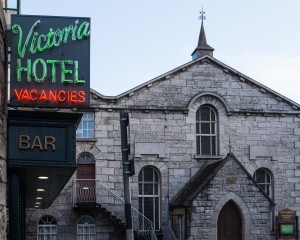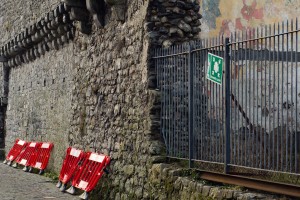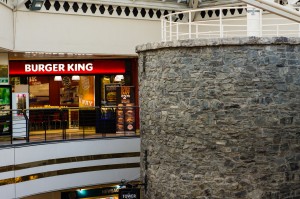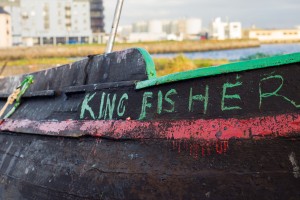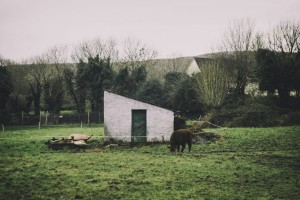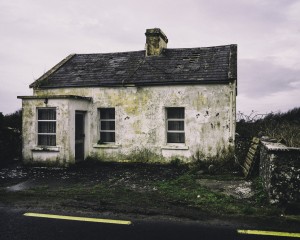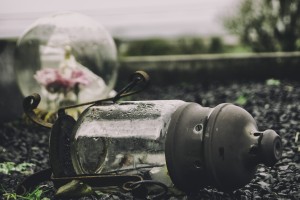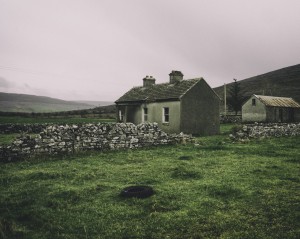I duck into the dimly lit interior of the pub, immediately confronted by the lyrics of an old eighties rock anthem. It sounds a bit like “We Built This City,” but the sound is too weak to hear clearly. A wide bar extends back and around the corner, lined every few feet with a set of lengthy mirrors. I glimpse a stage at the other end, void of any lighting. Off to my right sits a middle-aged couple sharing a pot of tea. The only employee glances over his shoulder at me and resumes watching rugby on the nearby television. I briefly consider leaving, but decide to take a seat beside the taps instead. The music swells a bit before dying out; replaced by the constant pulse of an overly bassy club track. As the beat builds the bartender throws his hands up and turns away from the game, trudging toward me reluctantly. I order a beer and a sandwich, and as he walks away I catch a reflection of his scowl. My drink tastes awful.
Ruminating on this, I nearly fail to notice the rush of cold air as the front door opens. The idle chatter of the couple quiets down, and the bartender, who has resumed watching sports, glances my way again. I follow his gaze to an old man, dressed in thick layers and soaked with rainwater, who is climbing up to the seat beside me. His beard is matted, knotted, and on the whole generally filthy, his hair is hidden beneath a worn wool hat, and his short legs kick rhythmically against the wood paneling. Thankfully I don’t smell any odor other than the mustiness of damp fabric cascading from him. The bartender grimaces, openly this time, and moves our way.
“A whiskey, no ice,” says the old man, in flawless English.
The bartender opens his mouth, closes it, checks his watch, and nods. I wonder if he ever manages to get any tips. The could-be hobo swivels to face me.
“That beer is terrible,” he says, jabbing a stubby finger at my drink. I smile involuntarily and agree. Somehow his own glass is already empty, though I could swear he never put it to his lips. He orders another. I drain my sickening excuse for a beverage as quickly as I can manage and do the same, opting for a whiskey ginger this time.
“Now, that’s better,” he shouts, “ye might be alright yet!”
I laugh, and ask where he’s from.
“Ireland,” he says, pressing his hand over his heart, “and proud,” he adds with a final slap on the counter.
I ask which area, absorbed in his eccentricity.
At this he roars with laughter, beating the bartop with both palms. I glance around; the bartender is leaning over the counter, absorbed in his game, though the couple at the table looks less than pleased about my new friend.
“Ah, well, I think it’s about time for me to go,” he says, though he’s scarcely been here more than ten minutes. He drags his mouth across the back of his arm, hops off the stool, and walks out the door. With the rush of wind accompanying his exit the bartender finally notices what’s going on and begins yelling after him, before throwing his arms in the air again. He looks at me, and points at the exit. I shrug, unsure if I’m seeing a question or a command. At this he pauses for a moment, before letting loose a tirade consisting primarily of the words “Fuck,” “Out,” and “Arsehole.” I wave a twenty Euro note in the air, shrugging again. He walks over and snatches it out of my hand, his steps coinciding with the beat of the latest song on the radio. The couple behind me stifles a burst of laughter. I wait for my change. He walks back to the rugby game. I flick him off and stand, taking the tiny whiskey glass with me. I imagine this to be a very personal gesture of revenge.
Outside the rain has stopped falling, but the night remains cold. I grip my trophy glass tightly in my hand and begin to walk aimlessly down the alleyways. Most storefronts have begun to close, pulling large steel grates over the entrance and windows, the staff congregating in streams toward the nearest pub. Pulled along with them is a familiar looking mass of hair and clothing. I wave from across the road, beckoning him over. As he gets closer I hold the whiskey glass in the air and tell him it’s a gift from the barkeep. He laughs and takes it from my hands.
“How’s your back treating you,” he asks, rolling his new prize between his palms. I lock up, unprepared for the question.
“I know you have a bad back,” he rubs his own spine for illustration, “I’d like to help you with that.” His subsequent grin shows off just how few teeth he still has.
I decide to come to terms with the fact that this is where I die.
He pulls a knife from deep within the folds of his coat.
I feel satisfied that at least I saw it coming.
He begins to carve something into the whiskey glass.
I wonder if I should run away.
The hat shop down the street shuts its lights off.
“Ah, gorgeous!” he exclaims, putting the knife away with a flourish and holding the glass up. I lean in slightly to get a better look. Across the curve of the thing is an immaculately detailed depiction of an ancient castle, falling to ruin. Beside it is spread a field, replete with dotted groups of livestock and a few cottages. I realize that this is the weirdest mugging in the world.
“Fer you friend,” he says, presenting it with a low bow. I pluck it from his hands and continue to admire the fine detailing. It stuns me enough that I barely manage a dull thank you.
“Drink only from this, nothing else, and ye will have no more problems with yer back.” He doffs his cap. I begin to feel embarrassed by the lordly treatment, still off-guard from the strangeness of it all.
“If ye don’t,” he continues, “ye might very well be worse off.” Behind me I hear the voices of the couple from the bar. I glance toward them as I thank the man again. The female member of the couple mumbles, “uh, you’re welcome.” They speed up as they pass me. I turn back to the threateningly kind man, but I am left holding the whiskey glass alone in the street. It occurs to me that I need another drink.
~~~~~~~~~~~~~~~~~~~~~~~~~~~~~~~~~~~~~~~~~~~~~~~~~~~~~~~~~~~~~~~~~~~~~~~
The sun catches the lower edge of the clouds above me during its descent, casting a warm light across my face. I sit facing a small pond, swollen with rain, seen through a short avenue of wind-bent trees. Though I am sheltered from the relentless gusts that bow all foliage in the region, the surface of the water ripples and folds with the breeze. Instead, my hair is agitated every few minutes by the wake of passing cars. I regard the apple in my hand, and then turn toward the road behind me.
Warned long in advance by the sound of tires churning through small pools of water, I watch each time a vehicle roars by. Not once does a passenger look toward my alcove. Nor do they take notice as I struggle up the incline to their path, or as I gaze down the stretch of asphalt before me. Only as I begin walking against their flow do they acknowledge my presence, with small waves of the fingers, almost impossible to discern with their speed, or slightly nodded heads.
Even when confronted with a fresh, gorgeous set of scenery we cannot keep our grasp on the air of mystery. Upon first arriving in Ireland I took it upon myself to scale at least one of the many mountains rolling through the landscape. From below they seem to hold great secrets in their plateaus and crags. When at last I did struggle upward, encountering more than a few aberrations of nature on the way, I found that the multitudes of rocky hills I saw far and wide had lost their mystery. There was no more wondering what was over the ridge, nor pondering what the valley below might look like from such a height. I could confirm that the sights were spectacular, the activity fulfilling, and the oddities fascinating, but something critical had faded. With time I noticed the same with every member of the group. Slowly everyone fell back into comfortable habits; watching episodes of shows, playing video games, spending time simply lying in bed. As we grew to learn more about our surroundings we lost a disproportionate amount of interest in them.
Reflecting on this, I fail to notice the dark clouds spreading overhead. Rain begins to paint itself upon my glasses, and the heat of the sun vanishes from my back. Unceremoniously my reverie is broken. The stream of cars sputters and slows; I squeeze onto the shoulder of the road as they tear by. While waiting for the way to clear I watch raindrops bead on the fabric of my coat. Every few moments the droplets run together and form rivulets through the creases and folds. I lean on the low stone wall beside me, picking at the thorned ivy draped over the top. Across acres of green pasture squats a low, round tower, peering over the bay. As the scent of petrol finally begins to drift away I begin walking again. A hulking mountain lies off to my left; my current road hugs the base as it winds toward the shore. The expanse of fields surrounding me stretches up to the foot, quickly fading into equally vast fields of rock, lurching and piling upon each other up to the peak. Somehow picking their way through the terrain with a small measure of grace is a herd of cattle. The rain shows no signs of letting up, so I leave them behind as I round a long curve.
Even with our propensity for adaptation and forgetfulness, it doesn’t take much to rediscover an old fascination. The sight of the water’s edge, lit by a setting sun amidst the leafless trees, is more than enough to pull us back into the beauty of the world around us. Each recalled memory paves the way for an entirely new experience, be it one of repetition or revision.
The way we encounter our world, the first experiences, the boredom, the rediscovery, festers and is fed internally, and what emerges is often a distortion of reality. Growing temporarily weary of our surroundings fuels this phenomenon, a flood of uninterrupted experiences is a sure way to burn out even more quickly. In order to appreciate beauty, we must at times be bored of beauty. Rather than fight to preserve and document each and every moment, we must revel in the way we retroactively sculpt our experiences. Allow for tiredness, for forgetfulness, and for falsities.
I pass a trio of road workers, attempting to patch the corner of a bend despite the bombardment of water from above. They grunt a greeting, I nod in response. Far below me is a housing complex alongside an ancient tower. The nearby farmer has pulled his boats in for the winter, and they act as guardians where the gate once stood. Their vivid colors seem unreal beside the worn stone walls. By now the sun has sunk almost entirely beneath the horizon, and as I walk I can see the shadows of horses moving slowly among the thin trees. Lights in the nearby town begin to flicker into being. The rain slows. I exchange clipped greetings with a woman walking her dog, and above me the breeze shakes water from shivering branches. The small pony I met as I left town has retreated to a corner of its pasture, eyeing me warily in the growing dark. I wave at it before realizing that it has no idea what that means, though it does make a sound resembling a derisive snort. As I enter the pub I wonder how I will remember this.
